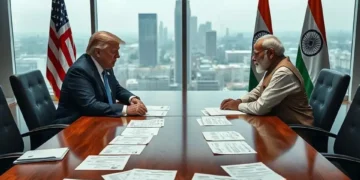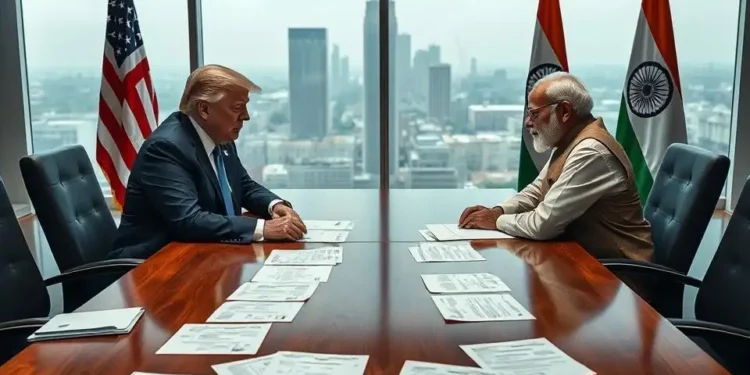Former U.S. National Security Advisor Jake Sullivan denounces President Trump’s steep 50% tariffs on Indian goods, warning they undermine America’s global image and risk driving India toward China.

American Brand Is in the Toilet’: Ex-White House Official Slams Trump’s India Tariffs
Sullivan Warns of Damage to U.S. Global Reputation
Former National Security Advisor Jake Sullivan, speaking on The Bulwark podcast, delivered a blistering critique of President Trump’s recent tariff policy targeting India. He warned that the steep 50% duties on Indian imports have tarnished the U.S.’s standing on the world stage, describing the current sentiment among global leaders bluntly: “the American brand globally is in the toilet”.
Sullivan underscored how this aggressive approach has recast the U.S. not as a reliable ally but as “a big disruptor”. He noted that many countries are now questioning Washington’s consistency, even as China appears increasingly “responsible” in comparison—a dramatic shift from sentiments just a year ago.
Strategic Fallout—India Leaning Toward China
Sullivan cautioned that the tariff assault may backfire by accelerating India’s strategic realignment. Years of diplomatic work aimed at positioning New Delhi as a counterbalance to Beijing have been undone, as India recalibrates its stance—seeking alignment with China as a hedge.
This shift is particularly notable given recent thawing in India-China relations, including Modi’s first visit to China in seven years following the Galwan clash in 2020. Analysts akin to Henry Wang of the Center for China and Globalization suggest that deepening ties between India and China are now “in an ‘up cycle’.
Escalating Tariff Tensions—A 50% Blow
Washington’s latest move is the culmination of a multi-stage escalation. In early August, the Trump administration imposed a 25% “reciprocal” tariff on Indian imports. This was followed by another 25% penalty specifically targeting India’s continued purchase of Russian oil, bringing the combined rate to 50%—one of the highest imposed on any trade partner.
White House trade adviser Peter Navarro has defended the tariffs as necessary leverage—arguing they could be reversed if India ceased buying discounted Russian oil, which the U.S. claims indirectly supports Russia’s aggression in Ukraine. However, critics from both the U.S. and India view the move as politically punitive rather than strategically targeted.
Warnings from Multiple Fronts
Sullivan’s criticism echoes concern voiced across political lines. Democrats on the House Foreign Affairs Committee condemned the tariffs, describing the move as “biased against India” and warning it may damage the long-term strategic partnership.
Beyond Washington, former Australian Prime Minister Tony Abbott and others caution that Trump’s trade measures are undermining the Quad alliance, threatening regional stability and U.S. influence in Asia.
Economically, experts like Jeffrey Sachs argue these punitive tariffs are self-defeating—potentially isolating the U.S. and jeopardizing decades of diplomatic progress.
As of late August 2025, the 50% tariffs remain fully enforced, with no signs of immediate rollback WikipediaPolitico. While the Biden-era diplomatic architecture and India’s strategic autonomy are still resilient, many analysts warn that reversing the damage will require deliberate outreach, substantive concessions, and confidence-restoring diplomacy from Washington.
Should meaningful engagement fail to materialize soon, the risk remains: a more assertive China and a strategic shift in New Delhi’s foreign policy orientation may permanently alter the Indo-U.S. partnership.
Jake Sullivan’s stark assessment—that the “American brand is in the toilet”—is more than rhetorical flourish. It signals deep concern that, in pursuing short-term pressure tactics, the U.S. may be compromising long-term strategic relationships and global credibility. If unresolved, this trade conflict could become a defining setback in one of America’s most important geopolitical partnerships.
READ ALSO…..Xi Jinping Hosts Putin and Modi at SCO Summit, Projecting a Global South Counterweight to U.S.2025















 Categories
Categories









